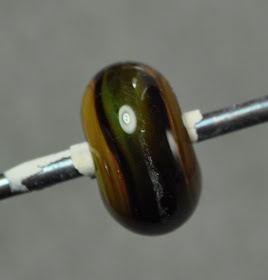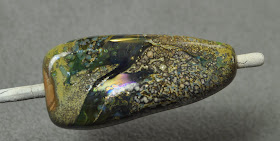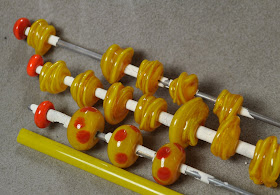Well - it happens to everyone eventually. Either the kiln, or the operator, fails and ooops - the temperature goes too high and you ruin a kiln full of beads.
So it was inevitable that it happened to me at some point. And it just did.
I was just heading past the kiln, and I looked at the temperature as I went by, and instead of a temperature, it read: "HTdE."
Hmmm. That's not normal.
Cracked open the kiln door - woo boy - it's glowin' like Chernobyl in there. The beads have actually dripped off the mandrels, and melted into a big free form plate (proving that glass really does want to be 1/4 inch thick).
Not good.
Ok, turn kiln off. Look again. The glass has flowed all over the floor of the kiln and the mandrel rests. The beads are one big puddle.
Nothing here is salvageable - let's try and mitigate the damage to my kiln.
Pull the mandrels out and put them aside - on something non-flamable, please!
The glass however - that's a lot of heat. Fill a bucket with water.
Pull the kiln rests out with the long tweezers, and take outside and dump into the bucket.
Inside the kiln, a few "cabochons" of glass remain - but some poking with the tweezers frees them from the floor of the kiln. Never did get around to putting on that recommended layer of kiln wash that all the books say you should put on the kiln floor for
just such an emergency. Fortunately - the kiln floor was fairly dirty - which made it easier to get the glass off.
Here's some pictures so you can see the gory details.
These are the mandrels - sans beads. :-(
My glass encrusted mandrel rests. Notice how nicely it goes with the autumn leaves?
Pulling it out of the bucket. A metal bucket would have been better, but I was in something of a hurry at that point.
See - it pays to not sweep out the floor of your kiln. You can see the accumulated flaked off bead release on the bottom of the glass. Once again, being lazy saves the day!
The error message,
HTdE, btw - is High Temperature Deviation - meaning the kiln overshot it's target temperature by more than 100 degress. Possibly due to a stuck relay. I will be watching the kiln like a hawk for the next little while.
Or possibly because I accidentally turned the kiln off, restarted the program, and didn't give it time to establish what temperature it was at before telling it to Skip Step. Seems to me I saw this happen before - it just didn't matter because there was nothing in the kiln at the time.
So - give it a few minutes if you have to restart the program on the kiln, and never forget to check the temp occasionally - just in case.
 Vineyard - a dark, translucent purple. A dark reddish, plummy purple. CiM says it is an opal, but mostly it reads as an opaque.
Vineyard - a dark, translucent purple. A dark reddish, plummy purple. CiM says it is an opal, but mostly it reads as an opaque.






























